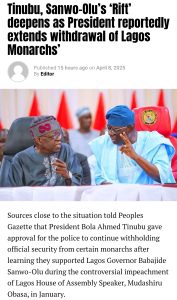The Weaponization of Insecurity in Nigerian Politics: A Troubling Pattern of Political Control
2 min read
— By Eculaw Media.
Recent events in Nigeria reveal a disturbing pattern where security apparatus appears to be deployed as tools of political leverage rather than for their intended purpose of protecting citizens. The timing of certain actions raises questions about the intersection of personal political disputes and state security functions.
Consider the curious sequence of events surrounding Lagos State Governor Babajide Sanwo-Olu. As reports emerged of tensions between President Bola Tinubu and his former political protégé Sanwo-Olu, we witnessed the Economic and Financial Crimes Commission (EFCC) intensifying investigations into Aisha Achimugo, allegedly connected to the governor. Simultaneously, security details were withdrawn from a traditional ruler reportedly allied with Sanwo-Olu. The convergence of these events suggests more than mere coincidence.
This pattern extends beyond Lagos. Senator Godswill Akpabio recently withdrew security details from Senator Natasha Akpoti-Uduaghan in what appears to be another example of security resources being manipulated for political purposes. These incidents illustrate how security protection in Nigeria has become a privilege extended to political allies rather than a right of public officials.
Security as a Political Weapon:
The implications of this trend are profound. When security becomes conditional upon political alignment, it transforms from a public service into a mechanism for control. Nigerian political elites appear to view the security apparatus not primarily as a shield against genuine threats but as a sword to be wielded against opponents.
This perspective helps explain the current allocation of security resources in Nigeria. A disproportionate share of police, DSS, and military personnel are assigned to protect political elites and their associates, while ordinary citizens face increasing vulnerability. The security services seem to operate on a dual track: protection for the connected and intimidation for the rest.
The Rivers State Situation:
The ongoing crisis in Rivers State offers another perspective on this phenomenon. The federal government’s approach to the political standoff between Governor Siminalayi Fubara and his predecessor Nyesom Wike (now a federal minister) has raised questions about whether instability is being tolerated—or even fostered—to justify federal intervention in the state’s affairs.
The deployment of security forces in Rivers appears selective, with their presence or absence seemingly determined by political calculations rather than security needs. This approach threatens to normalize political instability as an acceptable governance strategy.
The Path Forward:
Nigeria’s security challenges require a fundamental reframing of how the nation views and deploys its security resources. True national security demands that protection be provided based on objective threat assessments rather than political allegiances.
For Nigeria to progress, security must be depoliticized and restored to its proper function: protecting all citizens regardless of their political connections. The current approach not only undermines security institutions but erodes public trust in governance itself.
Until security becomes a public good rather than a political commodity, Nigeria will continue to struggle with building the stable foundation necessary for development and democracy.
*First Published In Eculaw Media*

